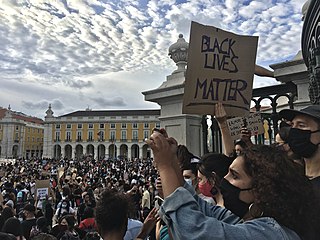
On June 6, in Lisbon, 5000 people gathered in Alameda and marched down Almirante Reis Ave in a peaceful manner to protest against the killing of George Floyd and for the Black Lives Matter movement, remembering the portuguese victims of police brutality and racism since the 90’s.
This photo is licensed under the Creative Commons Attribution-Share Alike 4.0 International license. Author: Anita Braga
10 Jun 2020 – So many of my white friends and I are anguished over the injustice of yet another Black man murdered by police. We find ourselves agreeing with Black Lives Matter that the strong and necessary response to the recent killings involves working not only for justice in these individual cases, but also for addressing the systemic racism underlying the repeated injustices.
Calls for system change must be more than slogans to which we nod our approval. The change must involve going beyond our comfort zone—affecting how we communicate with political leaders and friends about the types of change needed, and impressing on them how urgent our efforts are. Even if we can prevent the imminent destruction to the planet posed by global warming and nuclear war, survival demands that we also work to build a more just society.
System change has many parts and provides many opportunities for involvement. A first step is to communicate to political leaders our dismay that a system providing greater funding for policing, criminalizing, and imprisoning people than for feeding, providing healthcare, and housing deprives people of dignity and healthy lives. We must also question why budgets for urban police provide military grade materials for surveilling and shooting protestors, when money for human social services is insufficient. In response to our own question, we must point out that this systemic misallocation of resources contributes to a bloated Defense Department budget that bolsters authoritarian governments that neglect the needs of their own people.
To take that first step, you can phone the U.S. Capitol Switchboard at (202) 224-3121 to obtain contact information for elected officials. You can send the same message to candidates for office and as op-eds or letters to local media. For example, you can recommend forming a nonpartisan group of experts to confront the legacy of slavery and racism in the U.S. and propose ways forward, as proposed by Representative Barbara Lee
A second action involves assisting community organizations to speak with a larger megaphone by joining together. Several groups across the country are working hard to promote racial justice in our systems, amplify Black voices, and rid our country of an implicit caste system. If you’re able to do so, you can help by splitting a donation among organizations such as these, Reclaim the Block, Movement for Black Lives, Black Visions Collective, and Violence in Boston, as recommended by Senator Elizabeth Warren.
In addition, an important step we can all take is to examine the often unnoticed ways in which our own actions may unwittingly impede the needed change from a racist society to a more just and fair society. There are ways to be more reflective and to be more active in addressing racism in sectors of our personal lives, in schools, in work situations, and within families. A well thought out compilation of resources specifically for anti-racism work can be found here.
_________________________________________
 Marc Pilisuk, Ph.D. is a member of the TRANSCEND Network for Peace Development Environment, professor emeritus at the University of California Davis, and a faculty at Saybrook University, Berkeley, California. He is the author of 10 books and more than 140 articles over an academic career spanning five decades including a 3-volume anthology, Peace Movements Worldwide, with Michael Nagler (Eds) Santa Barbara, 2011; and The Hidden Structure of Violence: Who Benefits from Global Violence and War, with Jennifer Achord Rountree, 2015. He was a founding member of the first Teach-In, The Society Against Nuclear Explosions, and The Psychologists for Social Responsibility and a past president of the Society for the Study of Peace, Conflict and Violence. Among his recognitions is the Howard Zinn Award from the Peace and Justice Studies Association. Email: mpilisuk@saybrook.edu
Marc Pilisuk, Ph.D. is a member of the TRANSCEND Network for Peace Development Environment, professor emeritus at the University of California Davis, and a faculty at Saybrook University, Berkeley, California. He is the author of 10 books and more than 140 articles over an academic career spanning five decades including a 3-volume anthology, Peace Movements Worldwide, with Michael Nagler (Eds) Santa Barbara, 2011; and The Hidden Structure of Violence: Who Benefits from Global Violence and War, with Jennifer Achord Rountree, 2015. He was a founding member of the first Teach-In, The Society Against Nuclear Explosions, and The Psychologists for Social Responsibility and a past president of the Society for the Study of Peace, Conflict and Violence. Among his recognitions is the Howard Zinn Award from the Peace and Justice Studies Association. Email: mpilisuk@saybrook.edu
This is a lightly edited post originally published by Dr. Pilisuk on the discussion group of the Psychologists for Social Responsibility, of which he is a member.